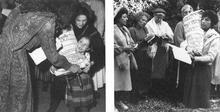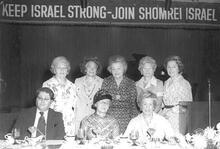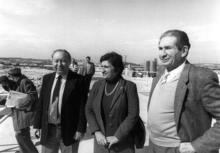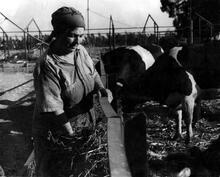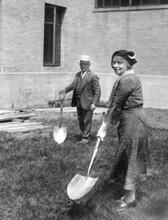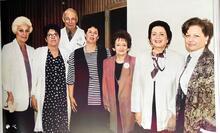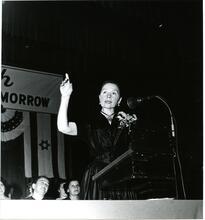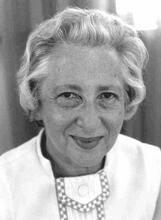Faye Libby Schenk
Fay Libby Schenk turned down a promising career as a zoologist to devote herself to Hadassah and other Zionist organizations. After earning a master’s in genetics, she moved with her husband to Australia in 1939 and became active in the Women’s International Zionist Organization. Returning to America in 1949, she joined Hadassah and climbed the ladder. During her presidency, from 1968 o 1972, Hadassah began rebuilding its hospital on Mount Scopus and created its Institute of Oncology in Jerusalem. Schenk also served as president of the American Zionist Federation, co-chair of United Jewish Appeal, vice chair of the National Council of the American-Israel Public Committee, and board member of both Hebrew University and the Jewish Agency.
Article
Faye Libby Herz Schenk rose to national and international prominence as a Jewish leader. Born on August 17, 1909, in Des Moines, Iowa, to Rebecca (Zeichick) and Naphtali Herz Zeichik, she received her B.A. and M.A. in genetics from Drake University, where she was offered a chair in zoology. A committed Zionist, she chose instead to direct her considerable talents and energies into organizing and strengthening Zionist organizations worldwide. From 1939 to 1949, she and her husband, Max Schenk, lived in Australia, where she became active in the Women’s International Zionist Organization. Upon her return to New York, she became active in Hadassah qand founded the Washington Heights Group for its New York chapter. Schenk went on to hold every major portfolio in Hadassah and eventually served as national president from 1968 to 1972. During her term as president, Hadassah initiated the rebuilding of its hospital on Mount Scopus and created its Institute of Oncology in Jerusalem.
While her primary organizational commitment was to Hadassah, Schenk’s enormous energy led her to assume leadership roles throughout the Jewish world, including president of the American Zionist Federation, cochair of Keren Hayesod–United Jewish Appeal, vice-chair of the National Council of the American-Israel Public Committee, and member of the board of governors for the Hebrew University and the Jewish Agency. In 1974, the Hebrew Union College–Jewish Institute of Religion conferred the degree of doctor of humane letters on Schenk.
After a full life of activity and accomplishments, Schenk made Lit. "ascent." A "calling up" to the Torah during its reading in the synagogue.aliyah in April 1978. Here her career reached its peak when she was elected to represent the World Confederation of United Zionists on the Zionist executive and was placed at the head of the organization department of the executive.
Faye Libby Schenk married Max Schenk, a Reform rabbi, in 1933. They had two children, Mina and Raphael, and five grandchildren. Faye Schenk’s charisma and warm personality drew people from all walks of Jewish life into the Schenk home, where she melded together her Orthodox upbringing with her Reform commitments and Zionist ideology. She was fluent in Yiddish and conversant in Hebrew, and her spirit embodied her deep love for Judaism and the Jewish people.
After surviving the September 1970 El Al airplane hijacking, Schenk declared, “Life owes me nothing more. I owe life everything.” Faye Libby Schenk died on her birthday, August 17, 1981, at age seventy-two and was buried on the Mount of Olives in Jerusalem.
AJYB, 83:362.
EJ (1973–1982).
“In Memoriam: Faye Schenk.” Published in Jerusalem by Hadassah (August 1982).


